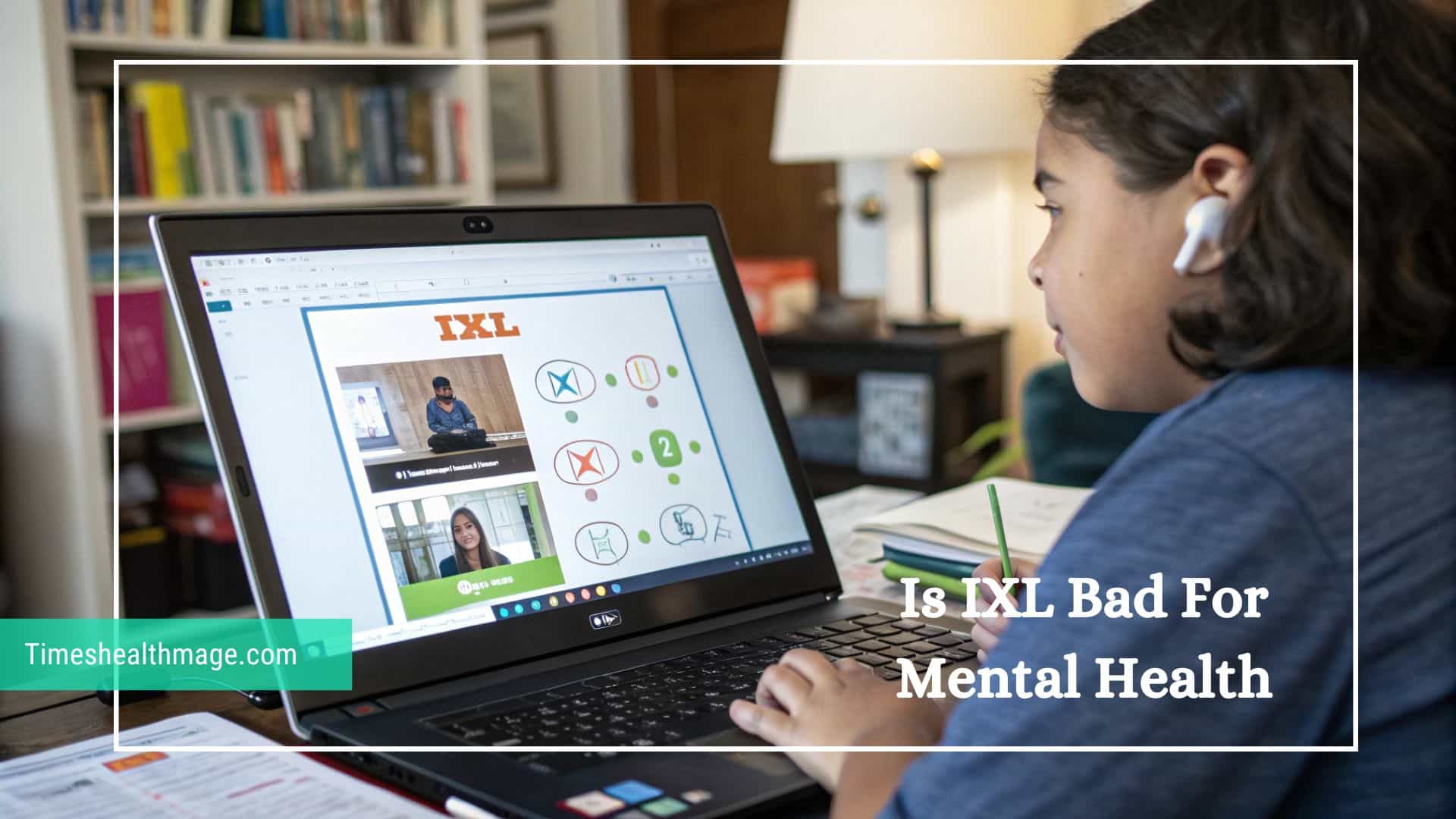In today’s fast-paced world of digital education, platforms like IXL have taken center stage in classrooms and homes alike. With promises of academic excellence, personalized learning, and skill mastery, it’s no surprise that IXL is widely used across schools in the U.S. and beyond. However, behind its sleek interface and adaptive question sets, a deeper question has emerged — is IXL bad for mental health?
This question isn’t just academic. It’s deeply personal for students who cry over lost SmartScore points, for parents who struggle to motivate their children, and for educators who notice signs of stress. In this article, we take a closer look at the emotional, psychological, and educational impacts of IXL, especially as they relate to student mental well-being. Let’s explore the multiple layers of this discussion — not to villainize technology, but to understand how it’s affecting young minds and how we can do better.
What Is It And How Does It Work? – Understanding IXL!
Before we dive into its potential mental health effects, it’s important to understand what IXL is. IXL is an online platform that provides skill-based practice in subjects like math, language arts, science, social studies, and Spanish. It’s built on a SmartScore system where students work toward a score of 100 by answering questions correctly. The more they get right, the higher the score — but if they make mistakes, the score drops.

Other features include:
- Immediate feedback
- Progress tracking
- Awards and badges
- Skill recommendations
- Time-spent monitoring
On the surface, it sounds like a great way to support learning. But for many students, the emotional experience tells a very different story.
Is The Repetitive Nature Of IXL Creating Pressure For Perfection?
One of the most common complaints about IXL is how repetitive it can be. While repetition is helpful in mastering certain skills, too much of it can lead to boredom, frustration, and even burnout — especially for children. Many students report doing 30 to 50 questions just to complete one skill. When one wrong answer can drop their score significantly, it doesn’t just feel like a learning tool — it feels like a test they’re constantly failing.
Emotional Effects of Over-Repetition:
- Feeling discouraged despite effort
- Becoming disinterested in learning
- Growing resentment toward subjects they used to enjoy
- Increased feelings of helplessness
This often raises an internal question for students: “Why keep trying if one mistake ruins everything?”
Is the IXL SmartScore System Hurting More Than It Helps?
IXL’s SmartScore system is designed to reflect true mastery by adapting the score based on performance. But the way it drops so dramatically with mistakes can make learning feel more like a punishment than a growth process.
Here’s a common scenario:
A student reaches a score of 90, just 10 points away from success. Then, they get one question wrong — and their score drops to 78.
Now they’re stuck redoing questions they’ve already answered correctly. Emotionally, this feels like a setback, not an opportunity.
How This Impacts Mental Health:
- Heightened anxiety during sessions
- Fear of failure that leads to avoidance
- Emotional breakdowns or crying fits
- Feelings of not being “good enough”
Children, especially those still developing emotional regulation, may not yet have the tools to cope with such intense feedback loops.
How Do Common IXL Features Impact Student Mental Health?
| IXL Feature | Intended Purpose | Mental Health Impact for Some Students |
|---|---|---|
| SmartScore system | Track mastery and progress | Can cause frustration, anxiety, and anger |
| Repetitive questions | Reinforce learning through practice | Leads to boredom, burnout, and disengagement |
| Instant feedback | Helps students correct errors in real-time | Can feel overly critical or discouraging |
| Badges and awards | Motivate through gamification | Promotes unhealthy competition in some cases |
| Skill recommendations | Personalize practice | Often misaligned with student learning styles |
| Time tracking | Encourage productivity | Increases stress, especially under supervision |
This table doesn’t mean that IXL always causes harm. But it shows that for certain students in specific contexts, the design can inadvertently increase emotional pressure.
The Problem with One Size Fits All Learning – Is Your Child Being Left Behind?
Another major concern is IXL’s relatively rigid structure. Although it adapts difficulty based on performance, it doesn’t cater to how a student learns best.
Some learners are visual, others auditory, and many benefit from hands-on activities. IXL relies heavily on text-based learning, which can:
- Alienate students with learning disabilities (e.g., dyslexia)
- Frustrate those who need visual explanations
- Cause mental fatigue in students who struggle with attention
If a student already feels behind in class, IXL might feel like a mountain they can’t climb — with no emotional support along the way.
Does IXL Undermine Student Self-Esteem And Confidence?
Many students start using IXL with the hope of improving their skills, but over time, some begin to feel worse about themselves. When their scores drop after a mistake, it feels like they’re being told they aren’t smart. This can hurt their confidence, especially if it keeps happening. Young learners may start to think they can’t do anything right, even if they try hard.
Instead of feeling proud of learning, they feel judged and discouraged. Over time, this can make them avoid schoolwork or feel anxious just thinking about it. Sadly, what’s meant to help them grow can sometimes tear down their self-worth.
Is Peer Comparison On IXL Harming Student Motivation And Well-Being?
In classrooms where IXL scores are displayed or discussed publicly, students are naturally led to compare themselves to others. While healthy competition can be motivating, it often backfires — especially for students who are struggling.
They might think:
- “Everyone else is better than me.”
- “I’ll never catch up.”
- “I don’t belong in this class.”
This leads to emotional withdrawal, reluctance to participate, and deep feelings of inadequacy — all of which are significant mental health red flags.
Parental And Teacher Pressure – A Silent Stress Amplifier!
Many parents and teachers use IXL to track progress and push students to do better, but sometimes, this pressure becomes too much. Kids may feel like they always have to reach a perfect score, even when they’re tired or struggling. When adults focus too much on results, children start to feel like their effort isn’t enough. This can create stress at home and in the classroom, making students nervous or upset.
They may begin to see learning as something stressful instead of something fun. Over time, this constant pressure can hurt their mental health and make them dislike studying altogether. What was meant to help them succeed can quietly turn into a source of emotional stress.
Is IXL Suitable For Neurodivergent Learners?
For students with unique learning needs such as ADHD, autism, or dyslexia, IXL may not always provide the right kind of support. Here are some key concerns:
- Lack of sensory-friendly features can make the platform overwhelming for students who are sensitive to sound, light, or movement.
- Rigid format and repetitive tasks may be difficult for those who need more variety or breaks in between activities.
- High text-based content can be challenging for students with dyslexia or processing difficulties.
- No emotional or behavioral support tools make it harder for neurodivergent learners to stay regulated during frustrating moments.
- Time tracking and performance pressure can lead to heightened anxiety or outbursts.
- Limited customization doesn’t allow teachers or parents to adjust the platform based on the learner’s pace or style.
These students often thrive with platforms that offer flexibility, multisensory content, and emotional support — areas where IXL may fall short.
Can IXL Contribute to Digital Fatigue and Screen Time Overload?
Students today already spend hours on digital devices for school, homework, and entertainment. When IXL is added to their routine, it increases their screen time even more, which can lead to digital fatigue. This means they may feel tired, lose focus, or become easily frustrated while using the platform. Physical symptoms like headaches, dry eyes, and poor sleep are also common signs.
Too much screen time can also affect their mood and reduce motivation to learn. For younger children, it may even interfere with their natural play and social time. That’s why it’s important to add regular breaks, include offline learning, and monitor how long they’re staying on educational apps like IXL.
Is IXL Always Bad? – A Balanced Perspective!
Not every student has a negative experience with IXL. In fact, some children enjoy its structured format, instant feedback, and clear goals. For those who are self-motivated or like challenges, IXL can feel rewarding and help strengthen skills. It also gives teachers helpful data to track progress and offer extra support where needed. The key is how it’s used — when balanced with breaks, encouragement, and flexibility, IXL can be a useful tool.
But when it’s overused or forced, it may cause stress and frustration. So, while it’s not always bad, it definitely isn’t a one-size-fits-all solution. Educators and parents must carefully observe how a child responds and adjust usage based on their emotional and learning needs. Finding the right balance makes all the difference in turning IXL from a stressor into a supportive learning resource.
How To Use IXL Without Harming Mental Health?
While IXL can be helpful for some students, using it the wrong way can lead to stress, frustration, or burnout. Here are five simple and practical tips to make IXL a healthier experience for learners:

Limit Daily Screen Time:
Set a specific time limit for IXL sessions, such as 15 to 30 minutes per day. This helps prevent digital fatigue and keeps students from feeling overwhelmed. Shorter sessions make it easier to stay focused and motivated. Always follow up with a screen-free break to rest the eyes and mind.
Focus on Effort, Not Perfection:
Instead of aiming for a perfect score, praise your child’s effort and progress. Celebrate the small wins, even if they don’t reach 100. This builds confidence and reduces pressure. Remind them that learning is about growth, not being flawless.
Offer Emotional Support During Frustrating Moments:
If your child becomes upset or discouraged, pause the session and talk it through. Let them know it’s okay to make mistakes — it’s part of learning. Sitting beside them during practice can also ease anxiety. A calm presence often turns frustration into resilience.
Balance IXL With Creative or Fun Activities:
Don’t let IXL be the only part of your child’s learning routine. Mix in storytelling, drawing, puzzles, or educational games. This creates a more enjoyable and well-rounded experience. A little creativity can reduce boredom and make learning feel less like a chore.
Let Students Choose Some of Their Practice Skills:
Give students a voice in what they want to practice. Allowing them to pick a few skills boosts ownership and motivation. When kids feel in control, they’re more likely to stay engaged. Choice builds confidence and turns stress into curiosity.
What Are The Best Alternatives To IXL For A Healthier Learning Experience?
Here are some IXL alternatives that may offer more flexible, engaging, or emotionally supportive learning environments:
| Platform | Strengths | Mental Health Benefit |
|---|---|---|
| Khan Academy | Video explanations + practice | More relaxed pace, no penalties for errors |
| Prodigy | Game-based math learning | Makes learning feel like play |
| Zearn | Teacher-guided + independent modules | Combines support with autonomy |
| Freckle | Adaptive tasks across subjects | Less rigid, student-paced |
| MobyMax | Customizable learning paths | Suitable for varied learning needs |
FAQs:
Can IXL cause anxiety or stress in children?
Yes, for some children, IXL can create performance anxiety. The pressure to get everything right and the fear of losing points can be overwhelming. This may cause children to avoid using the platform or feel nervous while doing homework. Emotional support is key.
Is The SmartScore System Helpful Or Harmful?
The SmartScore system is meant to show how well a student understands a skill. But if it drops too much after a small mistake, it can feel punishing. Some students take it personally and feel like they’ve failed. This can damage confidence instead of building it.
How Does IXL Affect Younger Students Emotionally?
Young children may struggle more with the emotional ups and downs of IXL. They’re still learning how to handle mistakes, so a score drop can feel very upsetting. This can lead to crying, meltdowns, or resistance to learning. Positive feedback and patience help.
Is IXL good for students with ADHD or autism?
IXL may not work well for neurodivergent learners. Its rigid structure, heavy text use, and lack of sensory-friendly options can be challenging. Students with ADHD or autism may feel overwhelmed or bored. They often need more flexible, interactive tools.
Can too much IXL use cause digital fatigue?
Yes, extended use of IXL can lead to digital fatigue. Staring at a screen for too long causes eye strain, tiredness, and difficulty focusing. Kids may become irritable or restless. Breaks and offline activities are important to keep learning healthy.
How can I make IXL less stressful for my child?
Set time limits, celebrate effort, and be present during tough moments. Let your child take breaks when needed and remind them that it’s okay to make mistakes. You can also alternate IXL with creative or hands-on activities. Support makes a big difference.
Conclusion:
IXL is not bad for everyone, but it can be stressful for many students. Some children enjoy it, while others feel anxious, frustrated, or sad. The way it’s used makes a big difference in how students react. Too much pressure, long screen time, or chasing perfect scores can hurt their mental health. That’s why balance, support, and kindness are so important.
Parents and teachers should watch how students feel, not just how they perform. Learning should help kids grow with confidence—not make them feel like they’re not good enough.
Also Read:


Leave a Reply